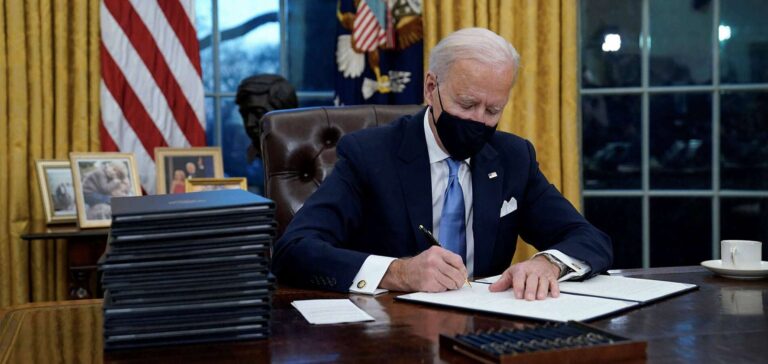TheParis climateagreement has recently made a comeback on the part of the world’s major powers.
Following China’s announcement of carbon neutrality by 2060, it’s now the turn of the United States to announce new climate efforts.
Newly elected President Joe Biden has decided to join the Paris agreement, while aiming for carbon neutrality by 2050.
This decision will have a considerable impact on limiting the rise in global temperatures to 2 degrees by 2100.
Paris Agreement: Biden turns the page on Trump
The end of an energy policy focused on fossil fuels
Under the Trump administration, energy policy was largely focused on supporting the exploitation of fossil fuels on American soil.
Based on the concept of “Energy Dominance”, this strategy aimed to give the United States true energy independence.
It was in this context that the Paris Agreement was seen in Washington as an obstacle to American energy sovereignty.
Having withdrawn from the agreement in 2017, the Trump administration launched a series of measures to deregulate environmental standards.
The oil and gas industry thus benefited from a drastic reduction in constraints linked to the regulation of methane emissions.
Likewise, the administration abandoned Obama’s Clean Power Plan, aimed at reducing CO2 emissions by 32%.
Last month, Trump authorized oil drilling in a protected reserve in northern Alaska.
Read on energynews.com: Keystone XL: Joe Biden buries the controversial pipeline
Is America a bad climate pupil?
This fossil fuel orientation of US policy has resulted in a serious slowdown in climate efforts.
According to Rodhium Group, the Trump administration’s actions would have added nearly 1.8 billion tonnes of CO2 by 2035.
To put this in perspective, this represents almost 30% of annual emissions in the United States.
Nonetheless, the lack of effort on climate issues needs to be qualified.
On the one hand, CO2 emissions have continued their downward trend, with gas clearly outpacing coal.
Secondly, in opposition to the Trump administration, many American states have announced ambitious plans for the environment.
California and New York, for example, have voted to become carbon neutral by 2050.
Paris Agreement: a lever for the energy revolution promised by Biden
Joe Biden’s ambitious energy plan
After four years of the Trump presidency, Biden intends to put the United States back at the heart of the fight against global warming.
By joining the Paris Agreement, he is sending a clear message of his determination to achieve carbon neutrality by 2050.
For him, unlike Trump, the agreement represents a tremendous opportunity to defend American leadership.
After all, the American withdrawal in 2017 had favored China’s rise to diplomatic prominence.
The latter had shown itself to be a responsible promoter of the global public good that is the environment.
It should also be added that the withdrawal risked weakening American industry in the competition for low-carbon technologies.
Read on energynews.com: Energy Transition 2050: what strategy for the IEA in 2021?
Concrete measures right from the start of his mandate
For all these reasons, Biden wants to rapidly implement strong measures before COP26 at the end of the year.
He has announced the reinstatement of environmental standards decided by Obama but abandoned by Trump.
He has also cancelled the construction permit for the Keystone XL pipeline by presidential decree.
He also intends to legislate a program to decarbonize the electricity sector by 2035.
This last objective now seems achievable following the change of majority in the Senate after the double victory in Georgia.
Controlling the legislative agenda, the Democrats can count on the vote of Vice President Kamala Harris in the event of a tie.
What’s more, despite losing seats, the Democrats still control the House of Representatives.
The impact of the United States’ return to the Paris climate agreement
The 2-degree objective is possible again
With a majority in Congress, the Biden presidency could represent a turning point in the fight against global warming.
According to Carbon Tracker, a carbon-neutral United States could reduce global temperatures by 0.1 degrees by 2100.
This may not seem like much at first glance, given that Washington is responsible for just 12% of emissions, compared with 25% for China.
Nevertheless, it could make it possible to achieve the two-degree target set out in the Paris Agreement, for two reasons.
Firstly, Biden’s election comes on the heels of carbon-neutrality announcements by a number of countries.
China, South Korea, the European Union and Japan have all announced this objective.
On the other hand, thanks to their economic power and influence, American decisions have a global ripple effect.
Read on energynews.com: China’s energy mix: towards a zero-carbon future
The potential knock-on effect of the US decision
Today, including the United States, almost 127 countries have announced targets for carbon neutrality by 2100.
This represents around 63% of the world’s CO2 emissions.
According to Carbon Tracker, all these announcements make it possible to limit the rise in global temperatures to 2.1 degrees.
As a reminder, the same organization estimated the probable rise in temperatures at 3.6 degrees in 2015.
Indeed, further efforts must be made if we are to avoid exceeding 2 degrees by 2100.
The Biden presidency could play a key role in accelerating the energy transition.
The knock-on effect of American decisions could force countries like India and Brazil to tighten their environmental policies.
It should be remembered that the Paris Agreement operates above all on a system of “peer pressure”.
Consequently, the return of the United States to the Paris agreement could prove to be a climate “game-changer”.
By creating a ripple effect, the return of the United States to the Paris agreement creates the conditions for a strengthening of the national contributions of the States (NDRC).
Above all, it allows the two superpowers, China and the United States, to finally align their climate agendas.






















